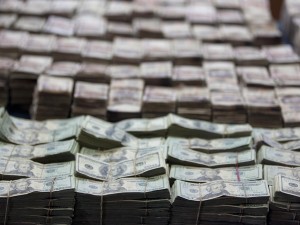NEW YORK – The dollar surged against the euro Monday as Spain’s borrowing costs hit a record high and Greece’s election failed to ease fears about eurozone debt crisis contagion.
The euro traded at $1.2571 around 2100 GMT, down from $1.2644 at the same time last Friday.
Against the Japanese currency, the euro was stable, fetching 99.45 yen compared with 99.47 yen late Friday.
The dollar firmed to 79.11 yen from 78.67 yen Friday.
Investors’ optimism fuelled by Greece’s election Sunday giving a narrow edge to pro-bailout supporter faded quickly, helped along by a jump in Spain’s borrowing costs to a fresh record high.
“A relatively uneventful day in North American trade created all the reasons investors needed to sell off risky assets today,” said Neal Gilbert at FX360.com.
“Evidently the euphoria that was generated upon the election of the pro-bailout/pro-euro New Democracy party in Greece wasn’t enough to keep traders satisfied,” he said.
The yield on the Spanish 10-year bond exceeded 7.0 percent, reaching its highest level since the birth of the euro in 1999.
Markets were worrying that Spain could be the next eurozone country to require an international bailout, after Greece, Ireland and Portugal.
“The dollar rebounded and sentiment moved lower as Greece’s New Democracy party, led by Antonis Samaras, attempts to form a coalition for the second time in two months and as Spanish government bond yields advanced sharply to new records,” said Eric Viloria at Forex.com.
“Comments from German Chancellor Merkel weighed on the euro as she indicated that there will be no leeway on Greece’s commitments and it must stick with its current program.”
Germany’s Chancellor Angela Merkel said Monday the new Greek government to be formed after this week’s election must live up to Athens’s undertakings under the EU and IMF-led bailout program.
“Elections cannot call into question the commitments Greece made. We cannot compromise on the reform steps we agreed on,” Merkel told reporters in the Mexican resort of Los Cabos just before the opening of a Group of 20 summit of the leaders of the world’s most powerful economies.
Meanwhile, traders were awaiting the start of the US Federal Reserve’s two-day policy meeting Tuesday. Economists were divided over whether the central bank would announce additional stimulus for the sluggish US economy.
The dollar climbed against other major currencies since late Friday. It rose to 0.9551 Swiss francs from 0.9496 francs, and gained ground against the British pound, which fell to $1.5665 from $1.5714.
